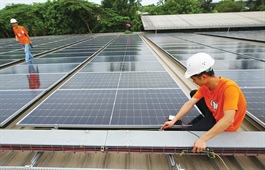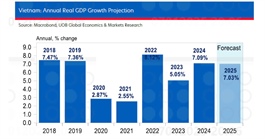Vietnam sees uptick in European business sentiment
Vietnam sees uptick in European business sentiment
EuroCham Vietnam released its Q4/2024 Business Confidence Index (BCI) report on January 8, revealing a significant rise in business sentiment, which reflects resilience amidst a turbulent global landscape in terms of economics, the environment, and geopolitics.

Photo: Le Toan |
The BCIscore surged from 46.3 points in Q4/2023 to 61.8 points in Q4/2024, marking a pivotal shift from a neutral to a positive sentiment in both current and future prospects. This surge comes despite ongoing operational hurdles and global economic uncertainties. Vietnam's strong performance is, in part, attributed to the country's continued growth trajectory, its improving infrastructure, and its emergence as a regional hub for both trade and investment.
For much of the past two years, the BCI hovered around the neutral midpoint of 50, dipping below it on occasions. The Q4/ 2024 report, however, marks a pivotal shift as the score reached its highest level since early 2022. According to the survey, 42 per cent reported feeling positive about the current business situation, with 47 per cent expecting similarly optimistic conditions for the upcoming quarter. More prominently, 56 per cent anticipated improvements in Vietnam's macroeconomic outlook in the first quarter of 2025.
“This is a clear sign that European businesses are increasingly confident about Vietnam's economic future,” said Bruno Jaspaert, chairman of EuroCham Vietnam. “This clear rise in sentiment reflects a wider recognition of the country's ongoing political and economic transformation it has seen over the years. The country's GDP growth confirms its position as a central player in Southeast Asian regional trade and investment.”
The uptick in business confidence can be attributed to several factors, most notably Vietnam's ongoing economic reform and its centrality in the global shift towards sustainability. Many respondents referenced the “double transformation” of digital and green transitions as key drivers of optimism. Businesses that have embraced these trends reported significant growth, with some even citing a 40 per cent increase in revenue compared to the previous year. The trend towards sustainability, spurred by both government policy and global pressures, is becoming a significant factor in shaping business strategies across multiple sectors.
Perhaps most notably, 75 per cent of survey respondents indicated they would recommend Vietnam as an investment destination. This data underscores the growing recognition of Vietnam's strategic importance as an investment hub within Southeast Asia. With its strong growth rates and expanding infrastructure, Vietnam has positioned itself as an attractive destination for European businesses looking to expand in the region.
“The growing confidence in Vietnam as an investment destination is a testament to the country's solid foundations in both trade and economic policy,” remarked EuroCham's chairman. “Despite global challenges, Vietnam's positive investment climate is creating new opportunities for European companies, especially in key sectors like technology, manufacturing, tourism, and renewable energy.”
"The data clearly shows that European businesses in Vietnam are increasingly optimistic about the country's potential as an investment destination," said Thue Quist Thomasen, CEO of Decision Lab. “A significant portion of businesses indicate plans to expand their operations in Vietnam. Approximately one out of four member companies are considering partnerships with Vietnamese suppliers or service providers, and more than one-fifth of the respondents are looking to expand their footprint in the country. Another 30 per cent are looking to increase their import/export operations and/or shift production to Vietnam. This move aligns with Vietnam's successful geopolitical positioning amid global trade shifts, particularly in light of recent disruptions to global supply chains.”
In November 2024, Prime Minister Pham Minh Chinh announced the formation of a steering committee to restructure Vietnam's government system. The goal of this initiative is to improve efficiency, decentralise administrative functions, and strengthen local accountability.
Many respondents to the survey expressed optimism that these reforms would lead to significant improvements in administrative processes, with 43 per cent expecting streamlined procedures in the long term, particularly with the adoption of digital platforms and reduced paperwork requirements. However, 36 per cent of respondents also expressed concerns about potential delays in processing applications during the restructuring phase. Despite these challenges, the government's commitment to digital transformation and e-governance was viewed as a positive step forward by a significant portion of the business community.
Jaspaert added, “Building Vietnam's regulatory framework is akin to constructing a house: any house that is built to last starts with a solid foundation. Transparent, clear, and efficient legal processes will enable the country to thrive, improve trade, and encourage investors to consider Vietnam to become their newest home. It is my conviction that Vietnam is about to enter its golden era. The current changes in the government's organisational apparatus are monumental, but the rewards – a thriving economy, increased foreign investment, and Vietnam's golden era – will make them worthwhile.”



























